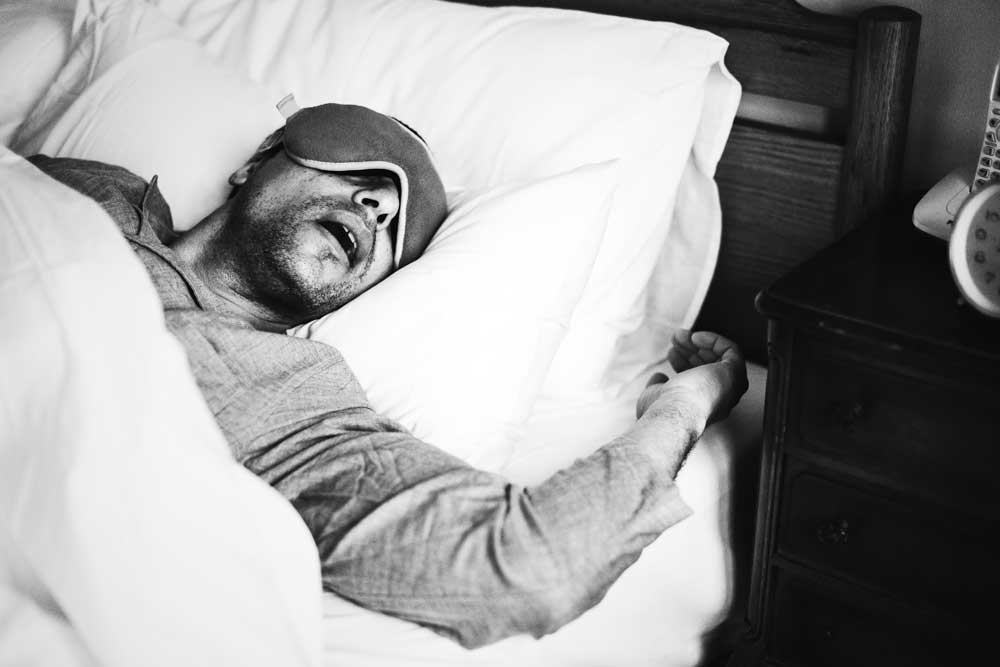While it may be a source of comedy at times, snoring is far from being funny: it is a real problem affecting our sleep, overall well-being, and intimate relations. Moreover, snoring can indicate general health issues; if untreated, severe snoring can lead to death.
A Growing Concern
Snoring can leave you with fatigue, difficulty concentrating during the day, and a heavy feeling of restlessness during the night. Research has shown that the incidence of snoring among adult populations has been steadily increasing. This is mostly attributed to unhealthy diets, poor nutrition, and weight gain. Attributed also to non-existent or untimely and maladapted exercise, increased cases of obesity and diabetes, and the heavy consumption of alcohol and other substances or medications that relax the muscles in the breathing cavity, allowing the passing air to vibrate and create various snoring sounds.
Types of Snoring
The average sound of a snore ranges between 50 decibels (regular conversation) and 80 decibels (vacuum cleaner) but can go up to over 110 decibels (low-flying airplane). Luckily, in most cases, the sound level of your snoring is not directly correlated with the severity of your condition. Snoring can come from the nose, mouth, tongue, or throat. The latter type is the loudest and worst of all. It is where the danger lies because throat snoring leads to sleep apnea.
The Dangers of Snoring
Chronic snorers often develop obstructive sleep apnea (OSA), where they intermittently stop breathing during sleep. The more significant symptoms of sleep apnea include waking up gasping for air and snoring so loud it disrupts your sleep and that of your surrounding, especially if you share a bed or even a room with someone.
It isn’t easy to self-diagnose sleep apnea. However, you may want to check with your primary physician for a proper diagnosis and treatment of sleep apnea if: you are being told that your snoring is extremely loud, if you wake up feeling unrested and moody, if you experience micro-wakings during the night, and the feeling of breathlessness, or even the need to use the restroom more often instead of sleeping through the night.
Prolonged periods of sleep apnea can result in higher CO2 levels, leading to more anxiety. The non-breathing periods can also lead to higher blood pressure and even an enlargement of the heart, triggering a series of cardiovascular conditions, including heart attack and stroke.
Can Snoring Be Treated?
Snoring can be treated in most cases, depending on the cause and severity.
Some soft treatment plans include lifestyle changes: weight loss, limiting or stopping the consumption of substances that lead to muscle relaxation in the breathing cavity, like alcohol and smoking, fixing your sleep environment and posture, good sleep hygiene, including cleaning nasal airways, and ultimately stopping any food or drink at least 3 hours before going to bed.
In advanced scenarios, there may be the need for physical intervention. Most anti-snoring gadgets are relatively safe; thus, worth trying – although their efficiency is limited to around 20% in the best-case scenario. For relatively milder cases, several options at pharmacies allow you to open obstructed nasal airways, like breathing strips that you stick on your nose before going to bed. In cases involving sinuses, there may be a need for a surgical intervention that will relieve the deviation or obstruction, allowing the air to flow naturally through your nose. For regular sleep apnea, many oral appliances control the tongue and the jaw for better airflow. However, severe sleep apnea cases require the use of machines like a CPAP or BiPAP to maintain normal airflow during the night. Your doctor is in a position to recommend what is best for your specific case.
A Brief History of Snoring
- Over 3,500 years ago, snoring was a problem that ancient Egyptians treated using Thyme. Fast forward to 2023, Thyme and other herbs are still used in many products and natural remedies that treat snoring today.
- Diyonysus, the Greek God of Fertility, is the first sleep apnea patient to be recorded in history, around 460 BC.
- The first caricatures of snoring appeared in Germany in 1887.
- The first oral prosthesis to help snorers was developed in 1892. From 1893 to 1919, many snore-help devices like chin bands were invented. In the 1950s, oral devices that hold the tongue forward were put in use.
- Sleep apnea, nighttime pauses in breathing, was called Pickwick, after the novel by Charles Dickens. In 1960, they started being called “sleep apnea syndrome.”
- In 1980, when science learned more about the various types of sleep apnea syndromes, the diagnosis of “sleep-related apnea disorders” was established.
- Historically, Queen Victoria, Winston Churchill, and Elizabeth Taylor were among the most famous snorers. In modern times, Tom Cruise’s snores are so bad that he had to build himself a soundproof space called “snoratorium.”
“Life is what you make of it: If you snooze, you lose; and if you snore, you lose more.” Phyllis George

